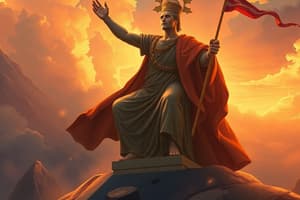Podcast
Questions and Answers
What is the term used by Adam Smith to describe the concept that individual self-interest can lead to overall economic benefit?
What is the term used by Adam Smith to describe the concept that individual self-interest can lead to overall economic benefit?
- Market equilibrium
- Marginal utility
- Supply and demand
- Invisible hand (correct)
Which economic system did Adam Smith critique due to its protectionist policies?
Which economic system did Adam Smith critique due to its protectionist policies?
- Mercantilism (correct)
- Socialism
- Capitalism
- Feudalism
What does the concept of 'Equality of Opportunity' suggest according to Adam Smith?
What does the concept of 'Equality of Opportunity' suggest according to Adam Smith?
- Success should be guaranteed for all individuals.
- Everyone should have the chance to be successful. (correct)
- Only the wealthy should have opportunities.
- Everyone should start with the same resources.
What was Adam Smith’s view on the government’s role in the economy?
What was Adam Smith’s view on the government’s role in the economy?
What is one of the beliefs held by capitalists regarding state support for failing businesses?
What is one of the beliefs held by capitalists regarding state support for failing businesses?
What ideology values individualism and seeks limited government intervention in both political and economic realms?
What ideology values individualism and seeks limited government intervention in both political and economic realms?
Which of the following principles does classical liberalism advocate for?
Which of the following principles does classical liberalism advocate for?
Which event marked a significant transition from an agricultural economy to an industrialized society in Britain?
Which event marked a significant transition from an agricultural economy to an industrialized society in Britain?
What describes the economic system based on free markets and minimal government intervention?
What describes the economic system based on free markets and minimal government intervention?
How does classical liberalism view human beings in relation to their decision-making?
How does classical liberalism view human beings in relation to their decision-making?
Which statement aligns with the principles of classical liberalism regarding government power?
Which statement aligns with the principles of classical liberalism regarding government power?
What phenomenon resulted from the shift to factory work during the Industrial Revolution?
What phenomenon resulted from the shift to factory work during the Industrial Revolution?
Which of the following best describes the belief in the protection of individual rights under classical liberalism?
Which of the following best describes the belief in the protection of individual rights under classical liberalism?
Flashcards
Invisible Hand
Invisible Hand
The idea that individuals pursuing their own self-interest in a free market will ultimately benefit society as a whole.
Capitalism
Capitalism
An economic system where individuals and businesses are free to operate with minimal government intervention.
Limited Government
Limited Government
The belief that government should limit its role in the economy, focusing primarily on protecting individual rights and enforcing contracts.
Equality of Opportunity
Equality of Opportunity
Signup and view all the flashcards
Protectionist Policies
Protectionist Policies
Signup and view all the flashcards
The Age of Enlightenment
The Age of Enlightenment
Signup and view all the flashcards
Classical Liberalism
Classical Liberalism
Signup and view all the flashcards
Individualism and Individual Rights
Individualism and Individual Rights
Signup and view all the flashcards
Economic Freedom and Private Property
Economic Freedom and Private Property
Signup and view all the flashcards
The Industrial Revolution
The Industrial Revolution
Signup and view all the flashcards
Capitalism (Laissez-Faire Economics)
Capitalism (Laissez-Faire Economics)
Signup and view all the flashcards
Urbanization
Urbanization
Signup and view all the flashcards
Mechanization of Labor
Mechanization of Labor
Signup and view all the flashcards
Study Notes
Classical Liberalism
- Rooted in the Enlightenment, a period following the Renaissance, characterized by flourishing arts, burgeoning wealth, and scientific advancements.
- Challenged the authority of the Catholic Church through the Protestant Reformation.
- Philosophers questioned the role of the individual in society.
- Promotes individual rights.
- Values political and economic freedoms with limited government intervention.
Core Principles of Classical Liberalism
- Protects rights and freedoms, emphasizing self-interest.
- Believes humans are rational and reasonable, benefiting self and society.
- Supports economic freedom and private property.
- Advocates for protection of civil liberties (assembly, dissent, religion).
- Emphasizes constitutional limitations on government power (checks and balances).
- Supports equality of opportunity.
- Disagrees with government control of printing, assembly, or movement.
Laissez-Faire Economics
- Originated in mid-1700s Great Britain, coinciding with the Industrial Revolution.
- Transitioned from agricultural/mercantile to industrial society.
- Urbanization grew, and factories and mass production emerged.
- Based on free markets, competition, consumerism, and profit-seeking producers.
Capitalism (Laissez-Faire Economics)
- Minimizes government intervention in the economy.
- Adam Smith, a key theorist, believed the economy followed natural laws.
- Advocated for equality of opportunity (everyone can succeed).
- Proposed self-interest fueled better outcomes for everyone ("invisible hand," "trickle-down").
- Disagreed with mercantilist protectionist trade policies.
- Advocated limited government role (rule of law).
- Proponents include Milton Friedman and Friedrich von Hayek.
- Favors tax breaks/incentives for businesses.
- Disagrees with subsidies for failing businesses or industries.
Studying That Suits You
Use AI to generate personalized quizzes and flashcards to suit your learning preferences.




